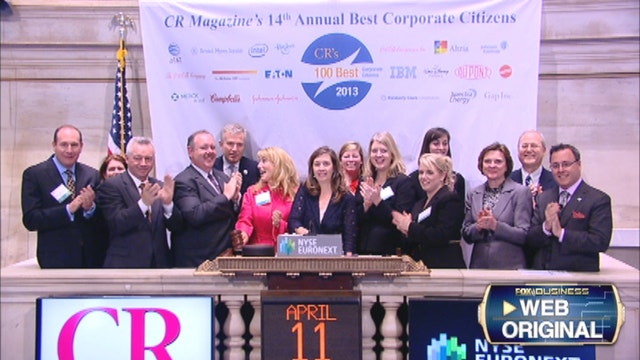Corporate Charity a Boon to Bottom Lines
When it comes to corporate responsibility, terms like charity and sustainability seem to supersede more lucrative words like money and profits.
But abiding by this certain code of social conduct can carry a wealth of benefits for corporations and their bottom lines, leaving those who choose to ignore it at a disadvantage, possibly even at the risk of spooking customers and investors.
“It provides a roadmap for better practice and, really, better performance,” said Elliot Clark, CEO of CR Magazine, which honored 100 publicly-traded companies last week at the New York Stock Exchange for showing outstanding corporate responsibility.
Whether it is to become more transparent, do the right thing or simply to appease stakeholders, regulators and benefit from tax breaks, giving back to the community can translate to happier workers and customers, ultimately cushioning a company’s balance sheet.
“For us it’s a win-win proposition,” said Niki Kelley, manager of Campbell Soup’s (NYSE:CPB) corporate social responsibility program office. “It’s a long-term delivering of shareowner value to all of our stakeholders.”
Already under the critical eye of Wall Street and the Securities & Exchange Commission, many publicly-traded companies have honed in on sustainability and social responsibility over the last few years, some to handsome rewards.
The big four accounting firms have even expanded their CSR disclosure policies in recent years as transparency continues to become a cornerstone of tighter regulations on Wall Street.
Meanwhile, consumers continue to look out for “green” products, with more companies placing environmentally-friendly labels on consumer goods in an effort to attract the conscious consumer.
In a survey commissioned last year by the American Gaming Association (AGA), nearly three-quarters of respondents answered it is of “high importance” that businesses be active in the community and work to protect the environment, while 75% said a company’s activities in the community and efforts to protect the environment have a “high impact” on whether or not they spend money with the company.
“In addition to improving employee morale and productivity, CSR programs also improve profits,” AGA chief executive Frank Fahrenkopf said in the report. The group at the time was at the helm of a year-long "All In" campaign in 2012 that highlighted the gaming industry's CSR efforts.
Fahrenkopf called it a “business imperative” and said Americans are cognizant to how companies act on a “number of different levels.”
Sandy, Recycled Phones: 2012's Corporate Leaders
CR Magazine ranked and honored 100 publicly-traded companies last week that showed outstanding corporate responsibility in 2012. The magazine used virtually all publicly-available documents as part of its commitment to transparency, and the top 20 winners, which included big names like AT&T (NYSE:T), which scored No. 1, as well as Intel (NASDAQ:INTC) and Campbell Soup (NYSE:CPB), rang the closing bell at the New York Stock Exchange last Thursday.
The CR Mag list analyzes 298 data elements among seven categories, including climate change, employee relations, philanthropy and human rights. Interestingly, another factor it uses is financial performance.
Among the top three was AT&T (NYSE:T), Mattel (NYSE:MAT) and Bristol-Myers Squibb (NYSE:BMW).
AT&T’s long-list of give-back initiatives include donating millions of dollars to its “it can wait” campaign that aims to raise awareness regarding texting and driving, building on the $100 million Aspire commitment that focuses on driving high school success and increasing its investment in education through another $250 million planned over the next five years.
In 2012, the company broke the record for most recycled phones in one week as certified by the Guinness Book of World Records, recycling 50,942 wireless devices, and it expects to continue ramping up that pace through its trade-in program. Other wireless companies offer similar recycle programs in an effort to stop the millions of devices from being sent to landfills each year. Sprint (NYSE:S), which scored 77th on the CR Mag list, even offers incentives of up to a $300 credit towards a new device.
Notably, several of the companies on this year’s list were recognized for their outstanding contributions in the aftermath of Hurricane Sandy, the East Coast’s worst natural disaster in a century that devastated the coasts along the New Jersey and New York shores.
Efforts to provide charitable funding and volunteerism among both small and large businesses increased in the weeks after Sandy, which triggered estimated $25 billion in insured loss and $50 billion in overall losses, according to German reinsurer Munich Re AG.
AT&T, Verizon Wireless, a joint venture between Verizon Communications (NYSE:VZ) and Vodafone (NYSE:VOD), as well as other carriers provided mobile charging stations in hard-hit areas for residents who lost homes or power, while AT&T and T-Mobile formed a temporary alliance enabling their customers to roam on both networks amid downed towers and stunted service, and waived late-fees.
Hess (NYSE:HES), which scored 78th just behind Sprint on the CR Mag list, donated $5 million to New York and New Jersey relief efforts.
Profits Still Supersede Charity
To be fair, while being socially responsible might be considered valiant, the company won’t win over investors without a sunny financial outlook, one reason why CR Mag uses financial performance as a metric in its ratings.
"Actions are not enough. It's the interpretation of those actions that matters,” said Deborah Small, a marketing professor with the University of Pennsylvania’s Wharton School of Business in a recent report analyzing the “financial impact of social impact.”
In the report titled “Nice Guys Finish Last and Guys in Last are Nice,” Fern Lin-Healy, a marketing professor at Auburn University, adds that businesses may have to make compromises when it comes to being socially responsible while also attracting investors.
"On the one hand, customers value socially responsible companies,” she said. “On the other hand, investors value companies with bright financial outlooks. Companies need to think carefully about how to strike a good balance."




















